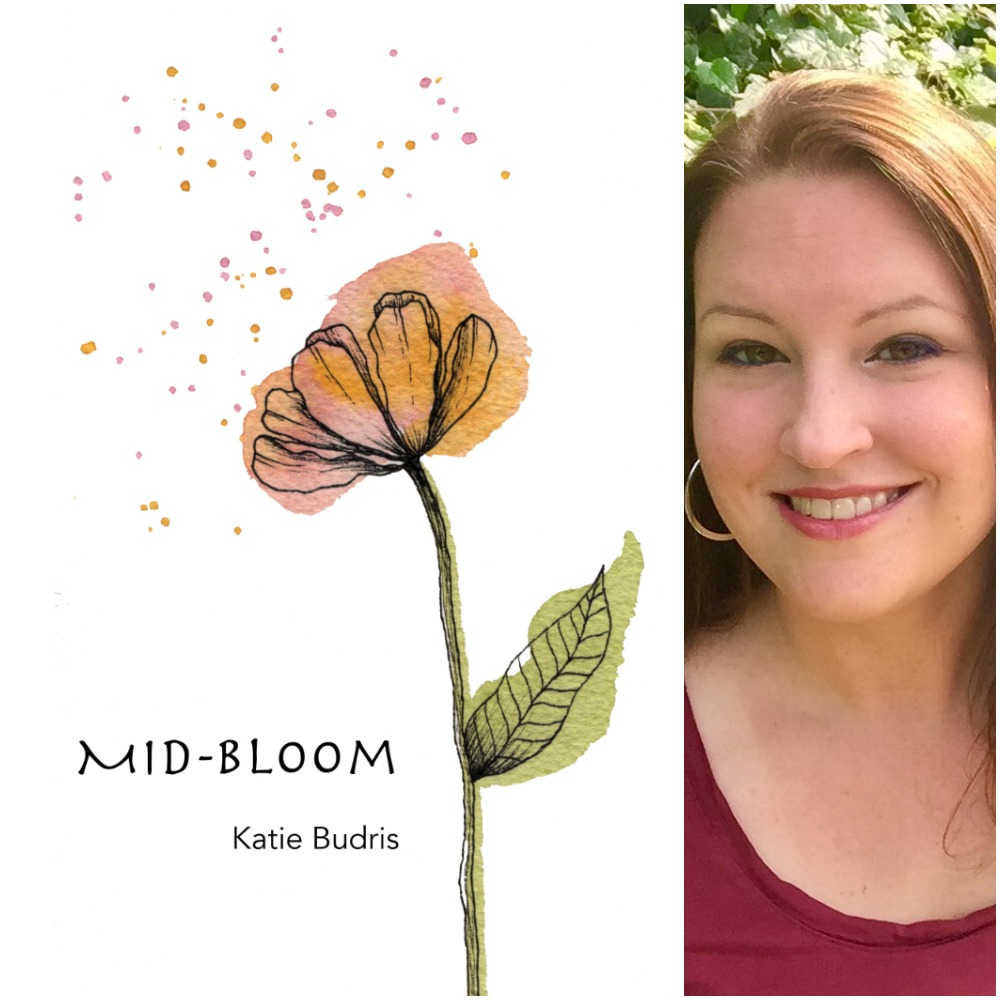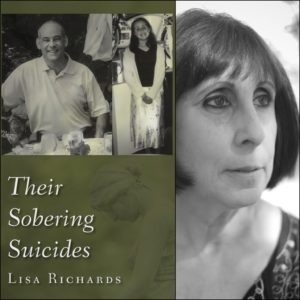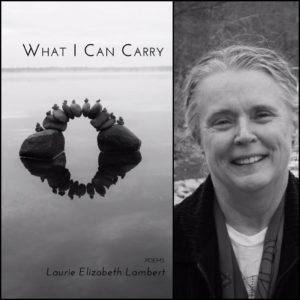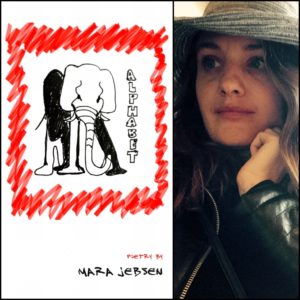Rich with both lyricism and story, Mid-Bloom is a gorgeous collection about how we fuel ourselves in the face of grief. How do we keep ourselves not just living but truly alive in the midst of life’s great, tragic promise: that all this must end? Potatoes, canoe rides, cigarettes, family, memory—the poems examine delightfully surprising specifics, showing the tender bravery required in our courage to keep on. By turns accessible and awe-inducing, Budris’s collection illustrates that poetry itself is prime sustenance for us all.
–Heather Lanier, author of Raising a Rare Girl and The Story You Tell Yourself
With imagery that ignites the imagination and memories that map the mud and muck of loss, grief, and illness, Mid-Bloom takes its readers on a journey in and through, to and from the past and present until the two coalesce in a moment of understanding as a daughter fights cancer two decades after she loses her mother to it. Budris questions her green thumb in several poems, but I hope she doesn’t doubt her poetic prowess. She nimbly wields her pen poem after poem to breathe life into a collection that isn’t “mid-bloom,” but one that is beautifully and heartachingly in full-bloom.
–Dawn Leas, author of A Person Worth Knowing, Take Something When You Go, and I Know When to Keep Quiet
Katie Budris’s poems explore seemingly ordinary moments–a family’s weeknight dinner, catching snowflakes, a mother caring for her daughter’s scraped knee–through the twin lenses of grief and memory. After Budris’s mother died young, “mid-bloom,” of cancer, these moments become anything but ordinary. Together, they weave a backdrop for the magical, dreamlike space in the final poem “If Things Were Otherwise,” where mother and daughter once again share morning coffee and soothing conversation, understanding each other more deeply than they ever did in life. These perceptive and tender poems resonate with love that abides, even after loss.
–Kathleen McGookey, author of Instructions for my Imposter, Heart in a Jar, and Stay






Abbey J. Porter –
Katie Budris’ recent chapbook, Mid-Bloom, is about survival—survival of the narrator when, as a young teen, she loses her mother to cancer, and survival of the narrator herself when she too faces a cancer diagnosis.
In this 19-poem collection, South Jersey resident Budris explores the shape of loss and change brought about by disease, in part by looking to the natural world.
Budris opens the collection with “5:00pm, Weeknight,” a glimpse of the narrator’s life at 13—presumably, before her mother became ill. In this world, the narrator’s biggest concern is dealing with pre-algebra. Her mother, a piano instructor, taps out time in another room—an unseen but nonetheless comforting presence. Here, we can count on small pleasures and rituals:
Dad will mash the potatoes
just the way I like them, serve dinner on
Mom’s floral china, placemats, oak table, grace.
Budris introduces the frailty of life in “Keeping Things Alive,” in which she describes the plants lining her window ledge—”bamboo shoots, devil’s ivy, an elephant bush,/two cacti, one orange, one yellow.” She details the efforts made to meet the plants’ needs: new pots, different windows. But among the stems and leaves, Budris finds her blue Betta floating dead in his fishbowl—a discovery that shakes her. She scribbles a note for her sleeping partner: I’m afraid all the plants are dying. Her sentiment suggests that the Betta’s death heralds a larger, systemic failure.
In perhaps the most baldly confessional, unabashedly grief-shocked poem of the collection, Budris shares the immediate aftermath of her mother’s death in “The First Morning.” Her voice is frank and vulnerable:
I know it’s almost noon,
but I don’t want to get out of bed.
You are not here…
I’ve never done this
before. Said goodbye
forever.
Nature is a recurring theme in Budris’ poetry. In “How to Survive a Blizzard,” she observes how a family of cardinals reacts to a winter storm:
They know
the best protection from a blizzard
is not to fly, but to burrow, escaping
the elements by surrounding themselves
in a cave to keep warm, wait out the storm.
One feels these lines speak also to the “storm” Budris weathers, and that the birds’ method of sheltering in place applies to her as well.
“Mid-Bloom” is another poem that looks to the natural world. Budris reflects that “My whole adult life, I have failed to keep/ a plant alive beyond a few months.” She goes on to reminisce about planting flowers with her mother when she was a child.
I’m not sure where in the last thirty years I lost
my green thumb. But there
in the backyard, my mother knew
I was capable, nurturing, and strong. As if
she knew I would be on my own
much too young when she left this world
much too soon, a flower mid-bloom
The poet also writes of her own experience with breast cancer, from diagnosis to hair loss. In “If Things Were Otherwise,” this experience brings her closer to her mother as she imagines an alternate reality in which her mother still lives. She contemplates the effects of the disease that she shares with her mother, to whom she has “never felt closer,/connected by cancer.” She concludes, “This time, we’re both cancer patients./This time, I’d understand.” Ironically, the disease that took her mother’s life also binds the two women.
A poem that stands out to me is “Waiting for the Blue Line, Chicago.” Budris describes toeing and leaning out over the colored stripe running along the platform, meant to warn passengers to keep back.
She wonders whether
she could see the train coming better from down there—
white cyclops barreling
out of the darkness
The narrator balances, literally and figuratively, pulled by an impulse that reminds me of Poe’s “Imp of the Perverse”: “There is no passion in nature so demoniacally impatient, as that of him who, shuddering upon the edge of a precipice, thus meditates a Plunge.” I admire the subtlety and shiver-inducing quality of the poem. In addition, “Waiting” strikes at the heart of the survival issue, asking whether the narrator can withstand the most dangerous force of all—the one that vacillates within her.
These accessible poems share the writer’s pain and hard-won wisdom with a quiet ferocity, and their impact lingers like the scent of a summer bloom.
Georgia Iris Salvaryn –
In her chapbook titled Mid-Bloom, poet Katie Budris takes her readers on an emotional journey—from mourning the loss of her mother after her battle with cancer to her own battle and survivor’s journey.
Each poem reads like a diary entry: an up-close encounter of all the thoughts and feelings being experienced and expressed. The line and verse breaks she uses are intentional, effective in giving her poems a steady pace while also emphasizing the emotion in each line and verse.
This collection speaks volumes about the battle with cancer and how it affects the patient/survivor and their loved ones. Through her reflections on memories, nostalgia and the world around her, Katie weaves a portrait of her loss and her life as a survivor.
In her poem “Relapse,” the reader gets a glimpse of her mother’s youth:
“…she remembers her first / apartment, above the Blue Moon / Café, Friday nights with her baby / spinning her polka dot skirt silly across / the dance floor,…”
In the following lines, we see where she is in “the present”:
“…early 50s, carrying the weight / of children, cancer, the cha-cha… / Heads / down the hallway. Takes the stairs one / by one. Slowly. / Aching”
The beginning starts with a nostalgic view of her mother’s youth and closes with an image of reality and where life has taken her. This poem is not only important to see how cancer affected her mother but how Katie reflects on the memories and how she focuses her lens on understanding her mother’s fight with cancer.
Her poem “Keeping Things Alive” questions her greenthumb and mourns the loss of her deep blue Beta:
“over two-and-a-half years, purchased / new pots and soil, tried different windows / and porches to identify the right combination / of direct and ambient light. / We thought we had the balance / figured out.”
The efforts of keeping these plants alive, doing anything and everything she can to prevent any of them from dying. I was clueless to the fact that this poem alluded to her divorce until I interviewed her about the chapbook. Read the full interview on inkmdc.com.
In “If Things Were Otherwise,” Katie mixes nostalgia with reflection and a sense of acceptance, imagining a conversation between her and her mother. Throughout the poem, there is this feeling of familiarity, the essence of her mother woven into the scenery:
“I’d follow the scent of Sanka and coffee cake / down the stairs, into the kitchen, like so many / mornings when I’d find you with friends.”
What made me so emotional when reading this poem was the understanding and the connection—
“Still you’ve never felt closer, / connected by cancer… / This time, we’re both cancer patients. / This time, I’d understand.”
I also empathized with her curiosity of their experiences: what are the similarities? As a Korean American who was adopted from South Korea at three-and-a-half months old, I have explored in my own poetry similar curiosities about my birth mother: what is she like? Reading this poem brought me back to those curiosities and has inspired me to explore this topic in my newer pieces.